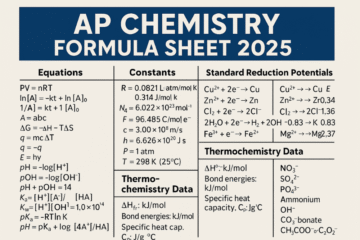Preparing for AP Exams is one of the biggest academic challenges for high school students in the United States. These tests can shape college admissions decisions, help you earn scholarships, and even allow you to skip certain classes in college. With so much at stake, it’s not surprising that students often feel overwhelmed. The problem is that many fall into the same traps year after year, making avoidable mistakes that cost them valuable points.
In this blog, we’ll walk through the ten most common mistakes students make while studying for AP Exams and how you can avoid them to boost your chances of scoring high.
1) Starting Too Late
One of the most common mistakes is waiting until the last minute to prepare. AP exams cover material from the entire school year, so trying to cram everything in just a few weeks before the test rarely works. Students who delay their preparation often end up overwhelmed, anxious, and unable to review topics in depth. Starting early ideally several months before the exam—gives you time to build a solid foundation, practice thoroughly, and still have room for revisions.
2) Ignoring the Exam Format
Another mistake is focusing only on content without paying attention to the actual exam format. Each AP exam has its own structure, whether it’s multiple-choice questions, free-response essays, or problem-solving sections. Students who don’t practice with the format may find themselves confused or rushed on test day. Getting familiar with the structure through practice papers and past exams can help you stay calm and use your time wisely.
3) Relying Only on Memorization
Many students believe that memorizing facts, formulas, and definitions will be enough. The truth is that AP exams are designed to test application, reasoning, and problem-solving skills. For example, in AP Chemistry, knowing a formula isn’t enough—you need to understand when and how to apply it. That’s why working with an experienced AP Chemistry tutor can be so helpful. Tutors not only help you learn the material but also guide you on applying concepts in real exam-style problems.
4) Avoiding Practice Tests
Some students shy away from practice tests because they feel intimidating. However, this is one of the biggest mistakes. Practice exams help you build stamina for the three-hour test, show you where your weaknesses lie, and get you comfortable with pacing. The earlier you start taking practice tests, the more time you’ll have to fix mistakes and improve.
5) Ignoring Weak Subjects
It’s natural to prefer studying subjects you enjoy, but ignoring your weaker areas can pull your score down. If you’re strong in history but struggle with biology or chemistry, avoiding those topics won’t help. Instead, make a conscious effort to spend extra time on your weaker subjects. Working with an AP Biology tutor, for instance, can give you the clarity and confidence you need to turn weaknesses into strengths.
6) Wasting Study Time
Students often spend hours with their books but don’t study effectively. Highlighting notes or rereading textbooks may feel productive, but it doesn’t guarantee retention. The most effective methods are active recall, practice questions, and timed drills. Short, focused study sessions with clear goals are much more beneficial than endless passive reading.
7) Skipping Free Response Questions
Free-response questions (FRQs) can make up a significant part of your score, yet many students neglect them. Writing under time pressure requires practice, and skipping FRQs during preparation often results in incomplete or poorly structured answers on exam day. Practicing them regularly, reviewing scoring rubrics, and even seeking feedback from teachers or peers can give you a huge advantage.
8) Not Reviewing Mistakes
Another big mistake is taking practice tests but not going back to analyze errors. Simply checking your score isn’t enough—you need to understand why you got a question wrong and how to avoid repeating the same mistake. Keeping a simple error log or revisiting incorrect problems until you can solve them easily helps build stronger understanding.
9) Neglecting Sleep and Health
During exam prep season, students often sacrifice sleep, skip meals, or overload on caffeine. While it might seem like a good idea to study longer hours, lack of rest and poor health habits actually hurt performance. Sleep is essential for memory retention, and a healthy body keeps your mind sharp. Consistency in rest and nutrition can often matter as much as study hours.
10) Preparing Alone Without Support
Finally, many students try to go through AP exam prep completely on their own. While self-study can work for some, most students benefit from guidance, whether it’s study groups, teacher feedback, or professional tutoring. An experienced AP Chemistry tutor or AP Biology tutor can make a huge difference by clarifying difficult topics, providing practice resources, and keeping you accountable.
Final Thoughts
Preparing for AP Exams doesn’t have to be overwhelming if you avoid these common mistakes. Start early, study actively, take practice tests, and don’t be afraid to seek help when needed. With the right approach, you can walk into exam day confident and ready to score high.



